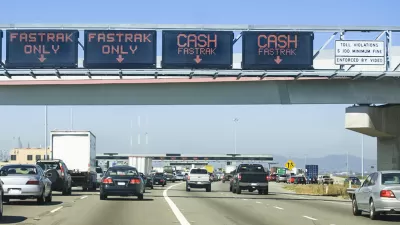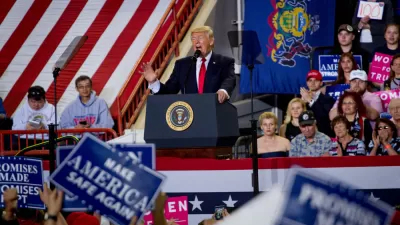A Washington Post/ABC News poll released Jan. 17 showed the exact opposite result of a Reuters/Ipsos poll released two days later on the financing for President Trump's $1 trillion infrastructure plan. However, the polls took different approaches.

The headline of The Washington Post article, "Most Americans don’t want new tolls to pay for road and bridge improvements, poll says," only asked one question on infrastructure.
The poll, conducted by telephone Jan. 12-15, 2017, asked respondents how they felt about private companies taking tax credits and allowing them to charge tolls in exchange for building roads and bridges. Furthermore, there was only one infrastructure question among the 46 questions that dealt with presidents Trump, Obama and other issues:
There is a proposal to offer nearly 140 billion dollars in tax cuts for private companies if they pay to build new roads, bridges and transportation projects. The companies then could charge tolls for people to use these roads, bridges and transportation. Do you support or oppose this proposal?
More accurate was how reported the finding for The Washington Post:
In [the] Washington Post-ABC News poll, 66 percent of those surveyed said they oppose a plan that would grant close to $140 billion in tax credits to investors who put their money into roads, bridges and transit in return for the right to impose tolls.
Why combine the two issues in one question? Why not ask about either tax credits or tolls?
While details of the infrastructure plan have yet to be released, "prior to the election, Donald J. Trump proposed giving private investors an 82 percent tax credit to put money into projects, credits that theoretically would reduce their need to profit from the investment," write Halsey III and Clement.
But even with tax credit incentives, investors are unlikely to put their money into projects that don’t provide a revenue stream, most likely in the form of tolls on roads and bridges.
====================================================================================================
The Reuters-Ipsos poll, conducted Dec. 16 – Jan. 12, released Jan. 19, took a different approach. Respondents were asked about three alternative options to finance Trump's infrastructure plan:
Do you agree/disagree with the following:
- I am willing to pay higher taxes to help invest in infrastructure in the U.S.
- 39.1% agreed
- 51.4% disagreed
- 9.5% unsure
- It is ok for the federal government to take on more debt to pay for infrastructure improvements
- 32.9% agreed
- 56.1% disagreed
- 11.0% unsure
- I am willing to pay tolls and user-fees to fund infrastructure improvements
- 50.1% agreed
- 41.4% disagreed
- 8.5% unsure
The result of the simpler and more comprehensive Reuters/Ipsos poll is quite clear: When offered three competing options to finance the trillion dollar infrastructure plan, tolls and user fees are most preferred, followed by higher taxes. The least favorite is debt-financing.
Hat tip to AASHTO Journal.
FULL STORY: Dr. Gridlock: Most Americans don’t want new tolls to pay for road and bridge improvements, poll says

Planetizen Federal Action Tracker
A weekly monitor of how Trump’s orders and actions are impacting planners and planning in America.

Restaurant Patios Were a Pandemic Win — Why Were They so Hard to Keep?
Social distancing requirements and changes in travel patterns prompted cities to pilot new uses for street and sidewalk space. Then it got complicated.

Map: Where Senate Republicans Want to Sell Your Public Lands
For public land advocates, the Senate Republicans’ proposal to sell millions of acres of public land in the West is “the biggest fight of their careers.”

Maui's Vacation Rental Debate Turns Ugly
Verbal attacks, misinformation campaigns and fistfights plague a high-stakes debate to convert thousands of vacation rentals into long-term housing.

San Francisco Suspends Traffic Calming Amidst Record Deaths
Citing “a challenging fiscal landscape,” the city will cease the program on the heels of 42 traffic deaths, including 24 pedestrians.

California Homeless Arrests, Citations Spike After Ruling
An investigation reveals that anti-homeless actions increased up to 500% after Grants Pass v. Johnson — even in cities claiming no policy change.
Urban Design for Planners 1: Software Tools
This six-course series explores essential urban design concepts using open source software and equips planners with the tools they need to participate fully in the urban design process.
Planning for Universal Design
Learn the tools for implementing Universal Design in planning regulations.
Heyer Gruel & Associates PA
JM Goldson LLC
Custer County Colorado
City of Camden Redevelopment Agency
City of Astoria
Transportation Research & Education Center (TREC) at Portland State University
Camden Redevelopment Agency
City of Claremont
Municipality of Princeton (NJ)




























